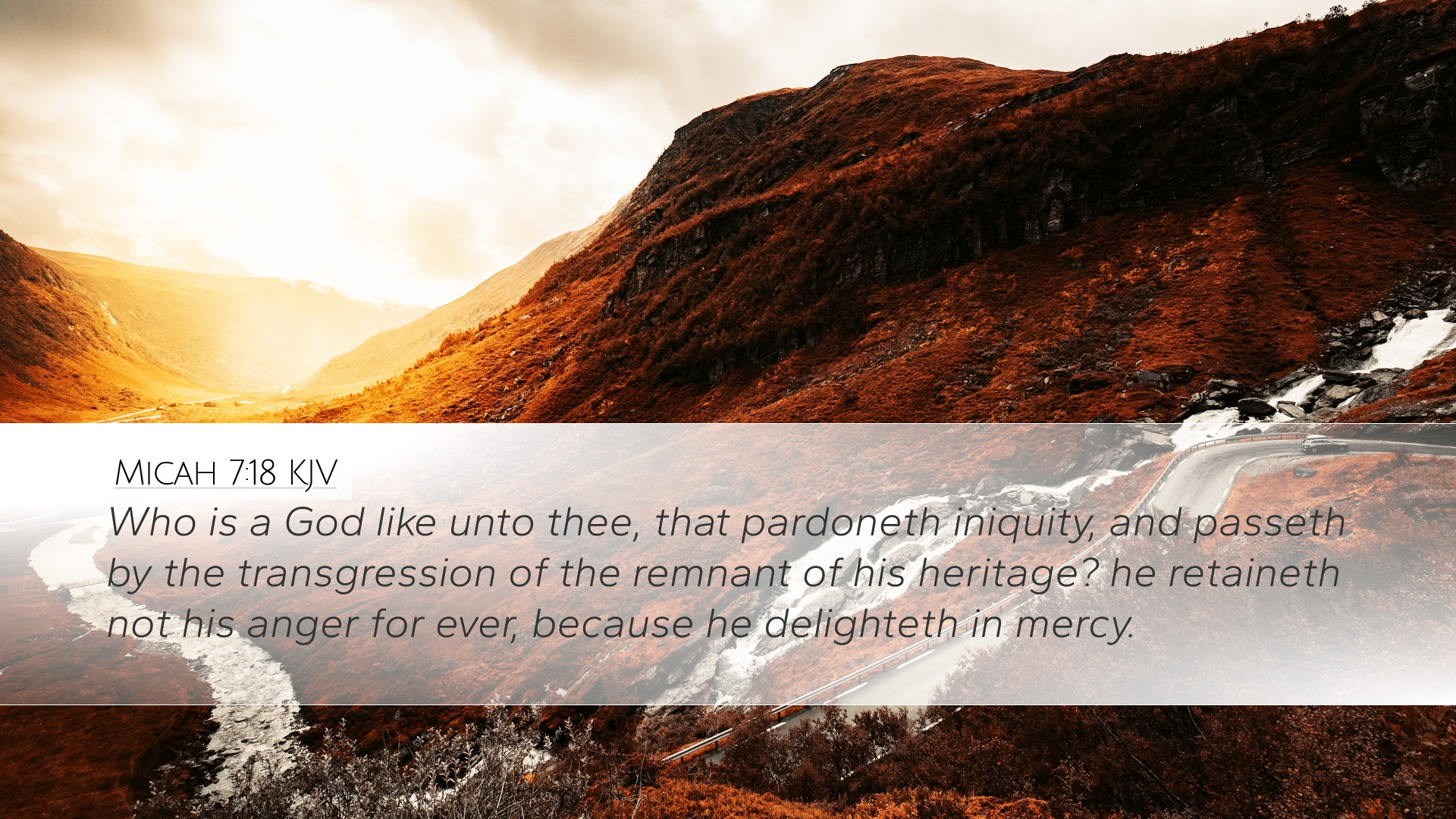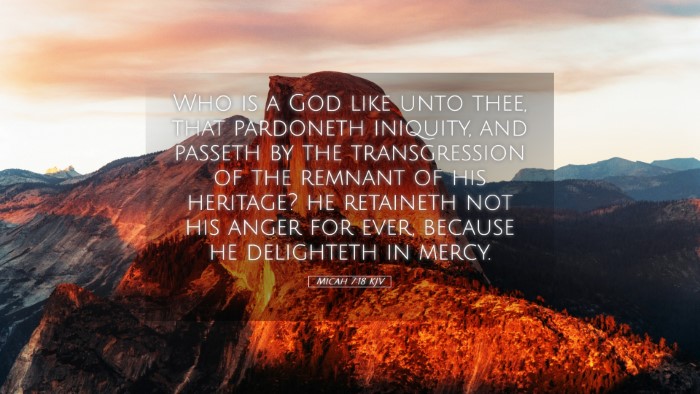Old Testament
Genesis Exodus Leviticus Numbers Deuteronomy Joshua Judges Ruth 1 Samuel 2 Samuel 1 Kings 2 Kings 1 Chronicles 2 Chronicles Ezra Nehemiah Esther Job Psalms Proverbs Ecclesiastes Song of Solomon Isaiah Jeremiah Lamentations Ezekiel Daniel Hosea Joel Amos Obadiah Jonah Micah Nahum Habakkuk Zephaniah Haggai Zechariah MalachiMicah 7:18
Micah 7:18 KJV
Who is a God like unto thee, that pardoneth iniquity, and passeth by the transgression of the remnant of his heritage? he retaineth not his anger for ever, because he delighteth in mercy.
Micah 7:18 Bible Commentary
Commentary on Micah 7:18
Verse: Micah 7:18 (KJV) - "Who is a God like unto thee, that pardoneth iniquity, and passeth by the transgression of the remnant of his heritage? he retaineth not his anger for ever, because he delighteth in mercy."
Introduction
This verse from Micah encapsulates a profound theological assertion regarding the nature of God. It emphasizes His unique ability to pardon iniquity and showcases the merciful character of the Divine. The insights gleaned from public domain commentaries provide a rich exploration of its implications for believers.
1. The Unique Character of God
Matthew Henry highlights that there is no one like God, underscoring His uniqueness in the realm of forgiveness:
- Divine Comparison: In asking "Who is a God like unto thee?", Micah draws attention to the unparalleled nature of God's grace and mercy as distinct from any other gods.
- God's Pardon: God's willingness to forgive iniquities showcases His character, indicating that His compassion is both personal and communal, aimed at His heritage.
2. Pardon and Forgiveness
Albert Barnes focuses on the theme of pardon, providing a deeper understanding of its significance:
- Nature of Pardon: The act of pardoning suggests a release from the guilt of sin, which Barnes notes is not just a legal or transactional act but a relational one, restoring fellowship with God.
- Transgressions Passed By: The phrase "passeth by the transgression" speaks to God's grace which overlooks the faults and failures of His people, emphasizing active mercy rather than passive tolerance.
3. Divine Anger and Mercy
Adam Clarke provides insights into the balance between God's anger and His mercy:
- Retention of Anger: "He retaineth not his anger for ever" contains the promise that God's displeasure is temporary. Clarke elaborates on how God's chastisement is punitive but always aimed at correction and restoration.
- Delight in Mercy: The assertion that God "delighteth in mercy" serves as a key theme in understanding biblical justice. This enjoyment of mercy transcends mere duty; it reflects the very heart of God.
4. Application to Believers
The implications of Micah 7:18 for contemporary believers are profound:
- Encouragement in Confession: Believers can approach God with the assurance that they will find mercy. The nature of God as one who forgives encourages confession and repentance.
- Hope in Restoration: Understanding that God's anger is temporary and His mercy is abundant gives hope during times of suffering and sin.
- Reflecting Divine Attributes: As followers of Christ, believers are called to imitate God's mercy in their relationships, extending forgiveness to others as they have received it.
5. Theological Insights
The theological significance of this verse cannot be understated:
- Doctrine of Grace: This passage illustrates the essence of grace, defining God's interaction with humanity as one marked by forgiveness rather than retribution.
- Hope for Redemption: The reference to the "remnant" implies that despite pervasive sin, God preserves a faithful remnant, giving hope for redemption and restoration.
Conclusion
Micah 7:18 serves as a powerful reminder of God's unique character as a God who forgives, delights in mercy, and graciously restores His people. It invites pastors, students, theologians, and scholars to engage deeply with the nature of God’s love and the implications for Christian living.


